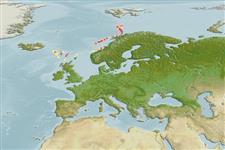Cactosoma abyssorum Danielssen, 1890
| Native range | All suitable habitat | Point map | Year 2050 |

|
| This map was computer-generated and has not yet been reviewed. |
| Cactosoma abyssorum AquaMaps Data sources: GBIF OBIS |
Upload your photos
Google image |
No photo available for this species.No drawings available for Halcampidae.
Google image |
No photo available for this species.
Classification / Names Common names | Synonyms | CoL | ITIS | WoRMS
Hexacorallia | Actiniaria | Halcampidae
Environment: milieu / climate zone / depth range / distribution range Ecology
Sessile; depth range 450 - 640 m (Ref. 96615). Polar; 77°N - 59°N, 11°W - 172°W
Distribution Countries | FAO areas | Ecosystems | Occurrences | Introductions
Northeast Atlantic and the Arctic Ocean: Faeroe Islands, Norway and Svalbard. Temperate to polar.
Length at first maturity / Size / Weight / Age
Maturity: Lm ? range ? - ? cm
Minimum and maximum depth based on occurrences (Refs. 119553, 96615).
Life cycle and mating behavior Maturity | Reproduction | Spawning | Eggs | Fecundity | Larvae
Members of the class Anthozoa are either gonochoric or hermaphroditic. Mature gametes are shed into the coelenteron and spawned through the mouth. Life cycle: The zygote develops into a planktonic planula larva. Metamorphosis begins with early morphogenesis of tentacles, septa and pharynx before larval settlement on the aboral end.
Main reference
References | Coordinator | Collaborators
Piepenburg, D., N.V. Chernova, C.F. von Dorrien, J. Gutt, A.V. Neyelov, E. Rachor, L. Saldanha and M.K. Schmid. 1996. (Ref. 2952)
IUCN Red List Status (Ref. 130435: Version 2024-1)
CITES status (Ref. 108899)
Not Evaluated
CMS (Ref. 116361)
Not Evaluated
Threat to humans
Human uses
| FishSource |
Tools
More information
Trophic Ecology
Food items
Diet
Food consumption
Ration
Predators
Diet
Food consumption
Ration
Predators
Ecology
Population dynamics
Growth
Age/Size
Length-weight
Length-length
Length-frequencies
Mass conversion
Recruitment
Abundance
Age/Size
Length-weight
Length-length
Length-frequencies
Mass conversion
Recruitment
Abundance
Life cycle
Distribution
Human Related
Aquaculture profile
Stamps, Coins Misc.
Stamps, Coins Misc.
Outreach
References
Internet sources
BHL | BOLD Systems | CISTI | DiscoverLife | FAO(Publication : search) | Fishipedia | GenBank (genome, nucleotide) | GloBI | Gomexsi | Google Books | Google Scholar | Google | PubMed | Tree of Life | Wikipedia (Go, Search) | Zoological Record
Estimates based on models
Price category
(Ref. 80766):
Unknown.


